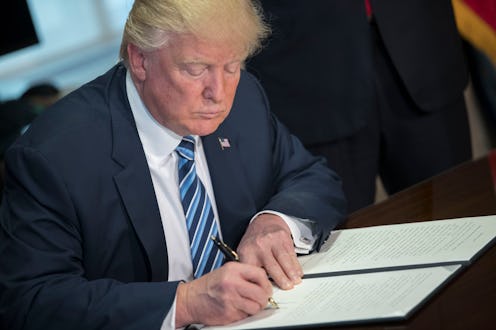News
Trump Issues New Travel Ban For 8 Countries

On Sunday evening, President Trump signed a new travel ban order that places restrictions on citizens of eight countries who attempt to enter the U.S., the Associated Press reported. The executive order, which is set to go into effect on October 18th, constrains U.S. travel rights for citizens of Chad, Iran, Libya, North Korea, Somalia, Syria, Venezuela and Yemen, and Trump signed it the day that his previous travel ban was set to expire.
The nature of the new order's restrictions differs from country to country. Syria will be subject to a nationwide travel ban, for instance, but in Venezuela, only senior government officials and their immediate families will have their entry to the U.S. restricted. Unlike earlier travel bans that Trump signed, this most recent order is intended to remain in effect indefinitely, although officials told the Washington Post that it will be "phased in" over time.
The list of countries has also changed. The first version of the travel ban applied to citizens of Iraq, Iran, Libya, Somalia, Syria, Yemen and Sudan; after the courts blocked that order, the administration removed Iraq from the list and made several other modifications. The most recent version adds Chadian, Venezuelan and North Korean citizens to the list as well while removing the earlier restrictions on Sudanese nationals.
Officials told the Associated Press that valid visas that have already been issued won't be revoked as a result of the new order. In addition, the order allows for waivers to be issued for citizens of the affected countries on an individual basis, although it doesn't guarantee that any waivers will actually be issued.
“These restrictions are necessary and conditions-based, not time-based,” an administration official told the Washington Post.
Each country will face a different set of restrictions. The order still allows Iranian citizens, for instance, to come to the U.S. via student exchanges, although it imposes enhanced screenings on such students. Somalis won't be allowed to emigrate to the U.S. permanently, but will be allowed to visit if approved on a case-by-case basis, while the restrictions on Venezuela only apply to certain government officials and their families.
The Trump administration isn't revealing the full justification behind each country's restrictions, however.
“Describing all of those reasons publicly, however, would cause serious damage to the national security of the United States, and many such descriptions are classified,” the executive order reads.
Trump's travel ban has gone through many iterations since his inauguration. During the presidential campaign, he called for a "total and complete shutdown of Muslims entering the United States," and less than two weeks after taking office, he signed an order flatly banning citizens from seven Muslim-majority countries from entering the country. That order was quickly blocked by several courts, however, even after the administration eased some of its restrictions on green card holders.
In March, Trump signed another, more limited version of the ban that excluded Iraq from the list of banned countries. However, a federal judge blocked that version as well just hours before it was set to take effect, a ruling that was upheld by a U.S. District Court Judge the next day.
After several more unfavorable court rulings, the Supreme Court partially revived the ban in June by allowing certain components of it to take effect. The high court ruled in the administration's favor again in September when it permitted the order's ban on refugees to take effect.
However, the Supreme Court still hasn't issued a full ruling on the constitutionality of the ban. It's set to hear oral arguments in the case on October 10th — eight days before the new version of the order takes effect.